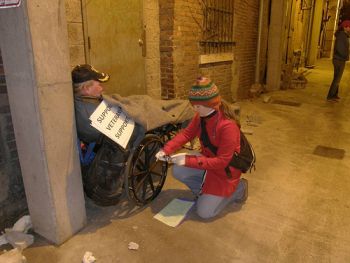On any given night, more than 68,000 veterans are homeless. But Community Solutions, with the help of local and national partners, is working to drastically reduce that number and see to it that returning veterans never become homeless in the first place.
Finding a stable place to live is one of the central issues facing returning veterans. Without a home, it’s hard to find a job, get back to school or heal from war-related injuries. These pieces of a successful transition to civilian life go together; a home strengthens access to employment, education, health and mental health treatment.
That’s why Community Solutions is prioritizing the housing needs of homeless and returning veterans with three innovative strategies that have national reach.
The 100,000 Homes Campaign is making strides toward ending veteran homelessness across the country. Working with the US Department of Veterans Affairs, the U.S. Interagency Council on Homelessness, The Department of Housing and Urban Development, Got Your Six, national partners and more than 170 communities throughout the country, the Campaign pledged to secure permanent homes for 10,000 chronically homeless veterans at the Clinton Global Initiative this summer. The Campaign is already more than halfway to reaching the goal.
One of the key tactics in meeting this target includes local Registry Weeks, in which communities are guided by the Campaign in identifying every homeless person on their streets by name and in gathering enough information to match them them with a home and needed health, mental health and employment assistance. Through this process homeless veterans are identified, who are then prioritized for housing assistance and resources available through the VA. The process brings together the whole community: local governments, non-profits, landlords, citizen volunteers and local VA medical center staff to combine their resources efficiently to get homeless veterans into stable homes.
The Campaign and its partners, including the Rapid Results Institute, have also created the Rapid Results Housing Placement Boot Camps, events that super-charge local efforts.
“We challenge communities to transform the way they work within 100 days. That forces them to innovate, cut red tape and try new things to get homeless veterans into homes,” said Jake Maguire, communications director for the Campaign. “Several communities have been able to go from housing a few homeless veterans a month to housing a veteran a day.”
Community Solutions’ focus on housing the most vulnerable homeless veterans across the country is one piece of a larger strategy that includes developing new forms of affordable housing for veterans, and creating new institutions to link returning veterans with housing, employment and education.
In Washington, DC and New Orleans, LA, we are working with local partners to build new supportive housing developments for returning vets and vets who are currently homeless.
In the District of Columbia, a few blocks from the Capitol, Community Solutions has teamed up with the Washington Conference of the United Methodist Church to build the District’s first mixed income supportive housing residence. The new 123-unit apartment building will provide high quality affordable homes for homeless and returning veterans, as well as health and employment assistance. Construction will start in the spring of 2013.
Community Solutions took a similar approach in New Orleans, where construction is now underway on the City’s first mixed income supportive housing residence for veterans. Working with partners UNITY of Greater New Orleans and HRI Properties, 40 affordable apartments are being created at 2101 Louisiana Avenue, a former senior residence badly damaged by flooding after Hurricane Katrina, then abandoned. The transformed property will be completed by March 2013.
If the history of modern homelessness in the United States tells us anything, it’s that transitions from institutions – including the military – are a time of great vulnerability to homelessness. Also, research shows that homelessness among veterans is disproportionately high, and often unfolds more slowly, after years of struggle to adjust to civilian life. Having transitional supports in place around housing, health and employment can help assure that soldiers returning from our long wars in Iraq and Afghanistan are never faced with homelessness.
To demonstrate a clear alternative, Community Solutions, working with partners including McCormack Baron Salazar, is planning a new type of community development: reintegration centers for returning veterans. These will be places that organize the critical connections needed for veterans to make successful transitions to civilian life.
To realize this vision, we are assessing underutilized VA Medical Center campuses across the nation and other available properties to develop a prototype center that would combine a range of affordable rental and ownership housing options, a community college and other educational links, job training in collaboration with local employers that is matched to hiring needs, a meeting space for families and service groups, links to VA medical and mental health services, and a small business start-up space, among other elements. Our goal is to identify an initial site and secure financing in 2013.




